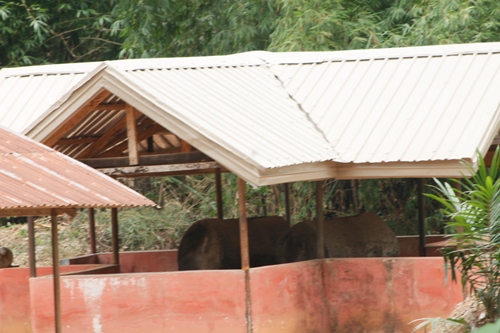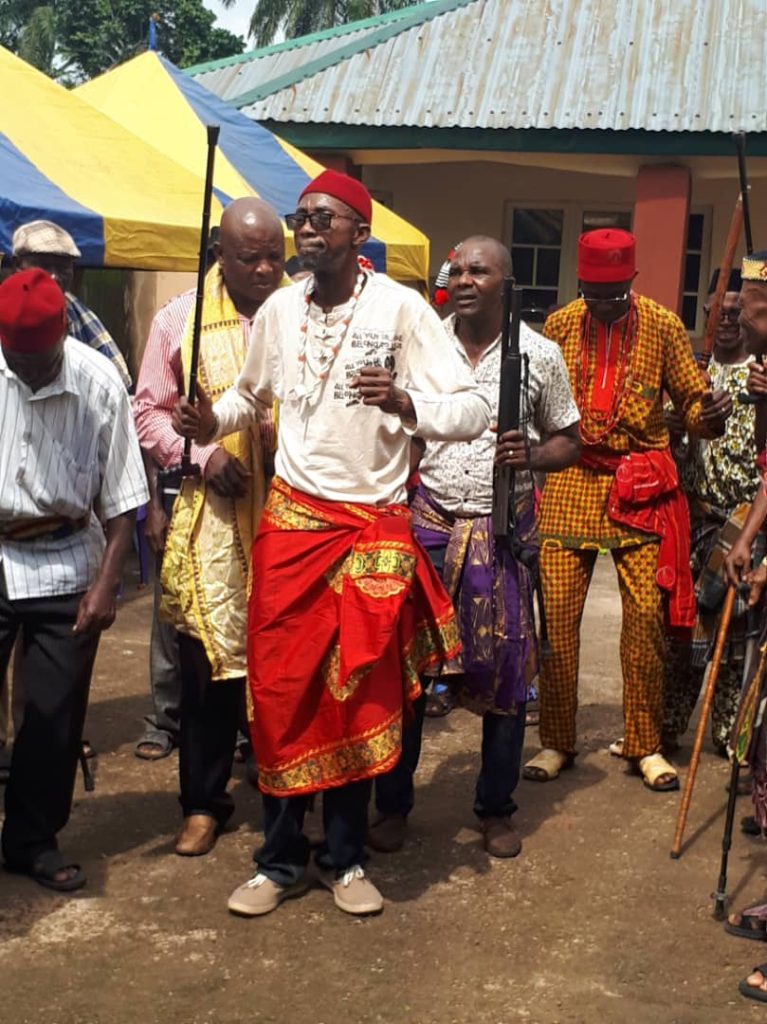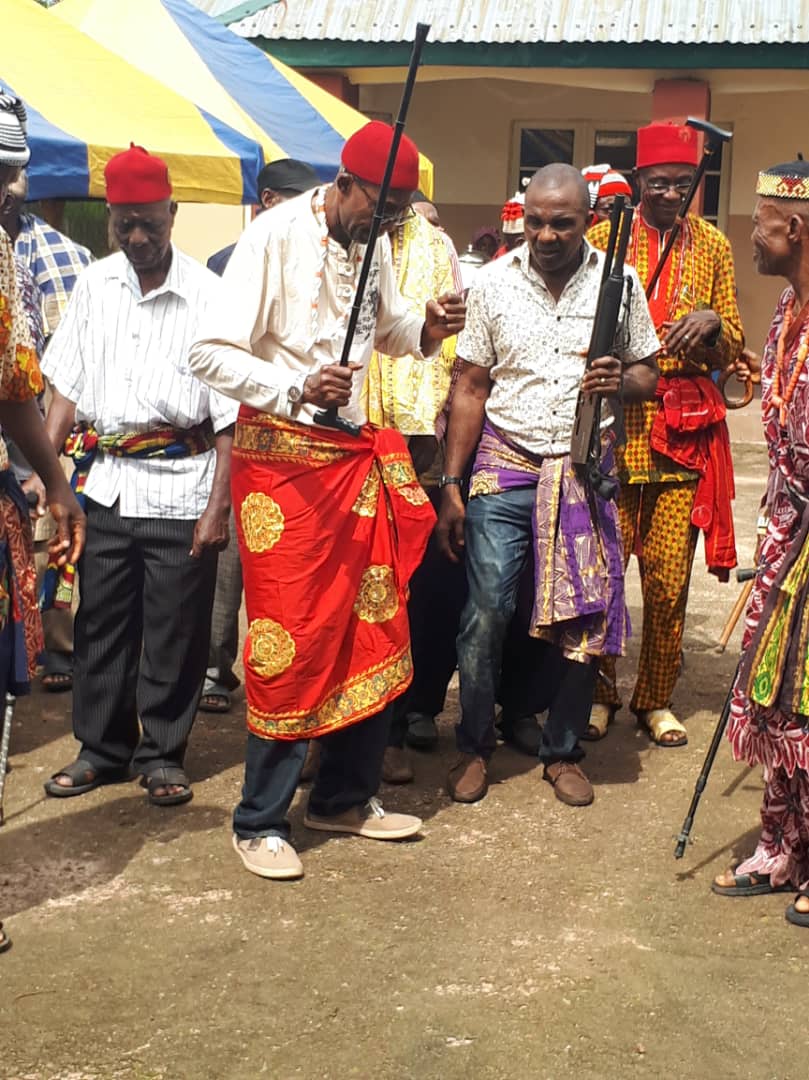OKWUKWU: FINAL BURIAL TRADITION IN OBOWO
The burial tradition of ‘Okwukwu’ is perhaps the only tradition that is practiced in every village in Obowo possibly because it is an age long tradition that effects both the living and the dead.
What therefore is the meaning of Okwukwu? Who is entitled to it? How it is performed and why is it necessary?
- Meaning
The meaning of ‘Okwukwu’ burial ceremony can be explained from two perspectives.
First, ‘Okwukwu’ is a corruption of the word “Okwa ukwu” – top rank, high rank or esteemed position. At the end of a successful Okwukwu burial ceremony, the deceased is deemed to have been elevated to a lofty position (Okwa ukwu) before or after interment (depending on when the ceremony is performed) in the belief that the deceased would maintain such a position in the land of the dead.

‘Okwukwu’ is therefore the final rites of honour bestowed on the dead so as to be make him happy, proud and accepted in the land of the dead.
Second, Okwukwu in Obowo dialect is descriptive of a congested or crowded (okwuru-akwu) gathering. It is derived from the crowded or congested (both for persons and edible items) environment which characterize the household or village square where the final burial ceremony is performed. The name elicits human traffic as well as suggests abundance of all the dignity and lavish wealth for both participants and observers at burial ceremonies.
Essentially, Okwukwu is a unique final funeral rites of passage and festivities in which the presence of kinsmen and extended family members of the deceased are expected as either participant or observers.
In Igbo traditional society to which Obowo is a part, there is nothing like second burial. A diligent research would show that there are two stages in every single death; albeit three categories of death.
The first is ‘ili madu’ – interment, and the second is ‘ikwa madu’ – post interment ceremonies; none of which is done twice or repeated as the word ‘Second burial’ would suggest. It seems to me, and is most likely that the time gap between the two stages in most cases gave rise to the idea of second burial which is misleading. Due to the problems associated with prolonged preservation of corpse in the morgue or other commitments of the deceased children/relations, interment is often carried our immediately while other funeral festivities are put off for weeks, months, or even years after interment.
As a tradition the ‘Okwukwu’ ceremony has come to stay as an important and significant tradition for notable men in all the villages in Obowo.
2. Who is entitled to Okwukwu?
It is imperative to highlight at this point, the three categories of death recognized in Obowo and to state at the same time that the type of death in respect of any deceased to a large extent, determines the nature of burial to be accorded and consequent funeral ceremonies.


Traditionally, Obowo recognizes three categories of death: (a) Onwu ojoo’-a sorry death- or (b) ‘Onwu aru’ – death that is not only bad but also an abomination which includes death by hanging, drinking of poison and all forms of suicide.
(c ) Onwu chi – normal or natural death, refers to the quiet and peaceful death not occasioned by questionable forces in contrast to ‘Onwu ike’, ‘Onwu mgbabi’ or ‘Onwu mberede’ – sudden, shocking, untimely or unripe death.
Notwithstanding the category of death, the initial consideration for the ‘Okwukwu’ ceremony entitlement is that the person must be dead, although not all dead people are accorded the rites.
Thus the final funeral ceremonies are for fulfilled adult men who were married with well- off children or those who ought to have married but for the vagaries of life before death.
From available oral facts, ‘Okwukwu’ on Obowo is performed for a person who died at a ripe age, must have been initiated into manhood (Iwa akwa), may have had wife or wives and must have performed the final Funeral ceremonies of his own dead father by the standards set by the village community.
In a case where a person dies after acquiring wealth but without wife and children, the immediate biological brothers, uncles or cousins who would inherit or share the deceased wealth can arrange and perform the funeral rites. No one dares to participate in the ‘Okwukwu’ preparation or eat with the participants if he is yet to perform his own father’s Okwukwu. Similarly, a person who has not performed his own father’s Okwukwu is not free to render any form of support in aid to anyone performing the ‘Okwukwu’ ceremony.
HISTORY
In 2014, a select group of very special people made a pledge to keep the history and culture of OBOWO Community alive. Led by a worthy son of Umuariam and driven by the belief that without an understanding of their history every generation must start over, this group decided to preserve the important heritage and lessons from the past so that Obowo children as well as visitors alike will have something to look forward to and learn from.
DIVISIONS
To achieve its mission, UHURI Cultural Center is divided into the following categories; each serving specific functions and objectives.
Heritage Identification and Preservation Division:
Acquisition and Maintenance Division:
Public Affairs and Communications Division:
Activities and Programs Division:
The activities and programs division is responsible for encouraging the sustenance of Obowo culture and heritage beginning with, and through programs and activities reminiscent of bygone years such as folklores, concerts, cultural music, drama and poetry. This division is equally responsible for promoting annual cultural activities such as IRI-JI, NTUMAKA and other festivals as well as the Age grade system and the associated IWA-AKWA ceremonies.
Ancestry and Lineage Division:
This division is to identify the ancestry, lineage and family heads of each Obowo village family units with a view of establishing a traceable family tree of each community as well as uplift the tie that binds the natives together. The division shall maintain a registry of each family unit and encourage each family to update the information with any addition to their members on annual or bi-annual basis. The updates should include any deaths among the family members within the period.
IT/Documentation and Production Division:
This division is responsible for the archival and documentation of all activities and programs of the Cultural Center for the public and future generations. The division shall prepare flyers, brochures, pamphlets as well as other publications that will enhance the image of the Center and disseminate information on the Center’s programs and activities to a wider community, both national and international.
Become a Volunteer and Make a Positive Impact
Volunteering benefits both the community and the volunteer. Here are some reasons why you should consider volunteering:
Personal Growth: Volunteering helps you develop new skills, gain experience, and build confidence. It’s a great way to step out of your comfort zone and try something new.
Social Connections: You’ll meet a diverse group of people and build lasting friendships. Volunteering fosters a sense of belonging and community spirit.
Career Opportunities: Volunteering can enhance your resume and make you more attractive to potential employers. It shows commitment, initiative, and a willingness to help others.




